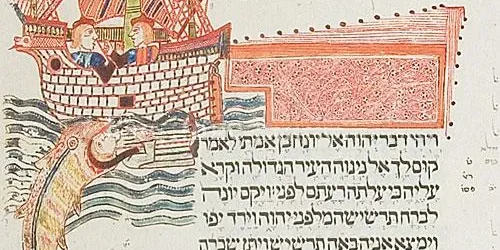What the Book of Jonah can teach us about grappling with this moment.
Cities around the world have mascots. London and Jerusalem have a lion and Berlin has a bear. Baltimore’s mascot is an oriole or raven, depending on which team you’re rooting for.
I am grateful to live in the State of Israel, and in the truly beautiful city of Jaffa. We have some of Israel’s oldest ruins and some of the world’s hottest jazz clubs, but the symbol of Jaffa is not an ancient archway or a baritone sax. No, the symbol seen all around Jaffa is a fish. Why, you may ask, with all that history and music, would scales, gills, and fins proliferate the city?
The answer is simple. Near the port of Jaffa thousands of years ago, a very big fish indeed—not a whale—made a meal of one of the most enigmatic figures in our Bible, the prophet Jonah. The Book of Jonah is one of the Bible’s shortest books, barely a page and a half. Jonah is the only prophet sent to save a non-Jewish population—Nineveh, in present-day Iraq. And he is the only prophet—ironically—to succeed.
His name is different, too. Unlike Jeremiah—which means exalted by God—or Isaiah—which means redeemed by God—Jonah, Yonah in Hebrew, means, simply, Dove. For Jonah was incredibly dove-like, prone to take wing. He is tasked by God to go to Nineveh and warn them to repent or meet the fire and brimstone fate of Sodom and Gomorrah.
The assignment seems pretty clear-cut but then Jonah thinks to himself:







